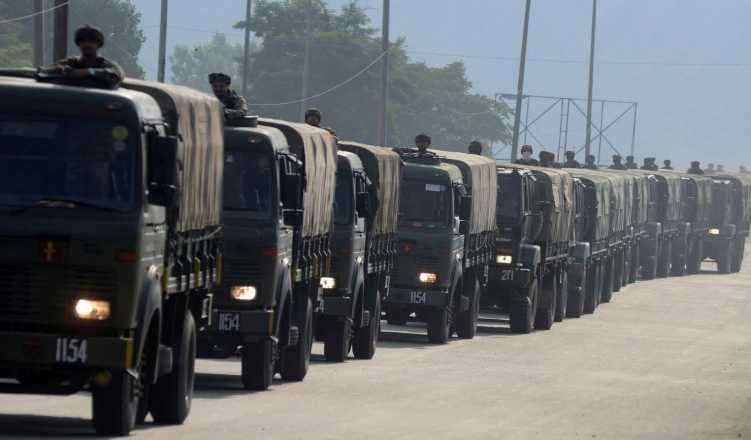Indian Army Arsenal To Decimate The Wuhan Virus
 Drones that can disinfect large areas in minutes, an ultraviolet-light sanitiser that can kill viruses in seconds and a surgical mask developed by 3D printing — the Army has developed a range of products to aid India’s battle against the Covid-19 pandemic.
Drones that can disinfect large areas in minutes, an ultraviolet-light sanitiser that can kill viruses in seconds and a surgical mask developed by 3D printing — the Army has developed a range of products to aid India’s battle against the Covid-19 pandemic.
The products have been developed by the Corps of Electronics and Mechanical Engineers (EME), an arms and service branch of the Army responsible for the design, development, trial, inspection and refit of weapon systems and other equipment.
A senior Army officer said that it was a routine practice for the corps to devise innovations from existing resources when a situation demanded critical engineering solutions.
“These current products are completely in-house designed and developed and have been user-validated,” the officer said. “We have some capacity to self-manufacture and are also open to industry collaboration for giving out wide-reach benefits to the nation,” the officer added.
The novel coronavirus that causes Covid-19 is known to spread through respiratory droplets, which can contaminate surfaces they come in contact with for varied amounts of time.
The surfaces can then constitute a transmission hazard but the virus, experts say, can be inactivated by chemical disinfectants.
The Army said the quadcopters — drones with four rotors — designed by the force were equipped with disinfectant sprays that can sanitise larger areas exposed to contamination in a short time.
The quadcopter can carry five litres of disinfectant at one time. With a spray height of 10 metres, it can cover an area the size of a football field in about five minutes, the officer added.
The drone is currently undergoing trials at the 505 Army Base Workshop in Delhi, the Army said.
The cost of each drone would be Rs 7.5 lakh and the Army can manufacture two in a week, but this depends on the availability of batteries, which has been limited because of the lockdown.
The UV-light sanitiser has been developed by the 509 Army Base Workshop in Agra. The sanitiser uses ultraviolet germicidal irradiation for disinfection.
According to the Army, the method uses short wavelength ultraviolet (UV-C) light to kill viruses and bacteria by penetrating the thin wall of the microorganism and destroying its nuclei. To operate it, one has to direct the light towards the target surface from a height of around 6 inches. The surface will be fully sanitised in 20 seconds.
The Army said the sanitiser can kill 99.9 per cent of surface bacteria and viruses without any use of chemicals.
The cost of the sanitiser would be Rs 800, and the Army can turn out 10 pieces a day.
The third innovation is a 3D-printed mask priced at Rs 1,200 apiece. Other products being devised include thermal scanners and anti-aerosalination boxes to keep doctors safe. The boxes are made up of transparent acrylic sheets and kept over patients to protect doctors and other healthcare workers from infection. Holes cut into the box help medical staff administer treatment to the patient without coming into direct contact.
The Army is just one of several sections across Indian society that are trying to chip in for the country’s battle against coronavirus, from scientists who have banded together to IITians churning out cost-effective and innovative solutions to ease the burden on the healthcare framework.
The Navy has developed an Air Evacuation Pod (AEP) to extract Covid-19 patients from remote locations.
The Naval Dockyard in Mumbai has also designed and developed its own low-cost handheld infrared-based temperature sensor for screening of personnel. The Visakhapatnam dockyard, meanwhile, has manufactured a portable system that can supply oxygen to six people at a time — a key innovation for healthcare services since Covid-19 affects the respiratory system and the conventional system only serves one patient at a time.




